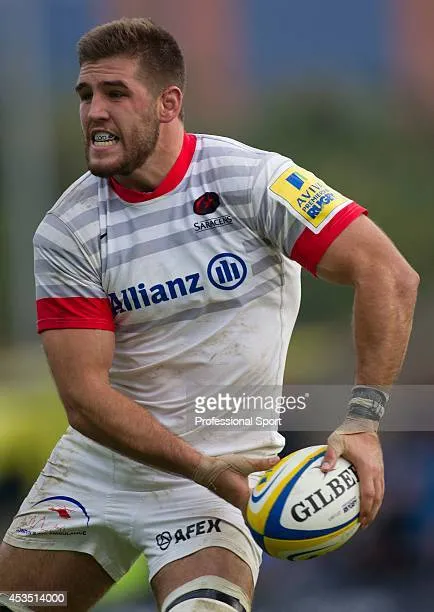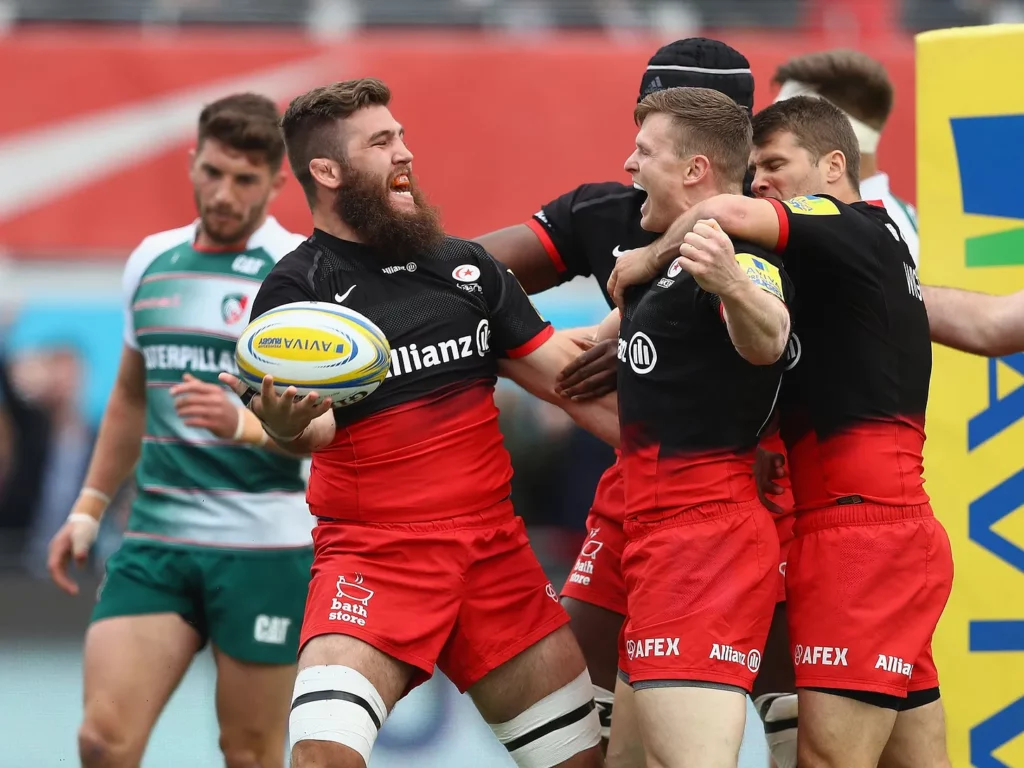#14 - Will Fraser
Former professional rugby player. Premiership & European cup winner with Saracens
Will joined the Saracens Academy in 2005 aged just 14 and was a member of the famed ‘Class of ’08’ alongside the likes of Owen Farrell & Jamie George. He went on to make 83 appearances for the club and was a part of the team during the historic 2015/16 European & Premiership Double.
Will endured a number of injuries during his 10 year playing career and a neck injury ultimately forced him to retire in 2017. After hanging up his boots, Will worked for the commercial arm of the club, working with many clients in different sectors, devising and delivering programmes, workshops and events to deliver high performance in the workplace.
In 2020, Will took his first entrepreneurial step in launching 100 & First. 100 & First was born from the realisation of the power of incredible real life experiences and how, if told in the right way, the learnings from them are applicable to any person or environment, the only difference is the context in which they are applied.

If you hadn’t been an athlete, what would you have gone into after school or university? And why?
I honestly have no idea!
I always wanted to be a rugby player and that was my sole focus. I did well in my A-Levels but my focus at 18 was on securing a professional contract and not going to uni or finding a job. My parents did make me apply to uni and thank god they did! But I deferred it for two years whilst I was getting settled at Sarries.
What experience or memory do you cherish most from your days of being a professional athlete?
Definitely winning the double in 2016, and actually playing in both finals! We beat Racing 92 in Lyon, which was the club’s first European title and that was such a special occasion. We then backed it up two weeks later at Twickenham to beat Exeter and win the Premiership. I’d missed finals and England summer tours before that due to injury, and so to be involved in these two triumphs was pure elation and made all the hard work and disappointments worth it.
What’s one thing you’re interested in or care about that most people don’t know?
Prisons and how we treat convicts; I’m utterly fascinated by it. I was fortunate to spend some time at the Feltham young offenders centre through the Saracens Foundation. The system’s approach to how we treat offenders is so broken and it makes it almost impossible for these people to integrate back into society. I’m hugely passionate about helping these people, who are generally from very tough backgrounds, and that’s the reason we’ve created our charity arm (100 & First Foundation) to help ex-offenders break out of the re-offending cycle and make something of their lives.

The prevalence of mental health problems in elite sport is incredibly high. Why do you think that is and how can we reduce it?
I’m lucky that I never really suffered whilst playing but it’s definitely a big, and growing, problem.
The game has become more and more professional in recent years. There are so many more outside influences now than there were even when I was coming to the end in 2017. Social media is a big one, with people constantly judging players – that has to take a toll. Also, with some of the money now on offer, players are being put in difficult decisions. Those at the top today do genuinely have the ability to be set up, in a way that was much less the case 5-10 years ago. That means there’s more switching of clubs and going abroad etc, all things that have the potential to be unsettling.
In terms of how to address the issue, clubs have to incentivised to help players and to help ensure they’re in a position to make a (relatively) smooth transition when their playing days are up. Without incentives being offered by the league or governing body, it’s hard to expect clubs to allocate finite resources to this type of thing when clubs are businesses and they need to perform like any other, and performance for them is what happens on the pitch.
Careers are full of ups and downs. What caused you pain and how did you deal with it?
Finishing early was tough, only 27. My best mates are still playing now. I had a good couple of years of what ifs (I should have done more, played in more finals, got capped etc). In the first season after I retired I was in the changing room with the boys after every game. In the second season I didn’t go to a single game! It was hard but Sarries were amazing and couldn’t have done more to support me.
But I’m very happy and very content now. I have a business that I love and an amazing family. I’ve been fully at peace since founding 100 & First. It’s filled the gap that rugby used to fill. I loved rugby because I was learning every single day and it’s the same with the business. I also have the same intrinsic drive to work on it that I had with my rugby. Of course, I’ve only been able to connect these dots in retrospect. I didn’t know starting a business was what I needed, it just felt like the right thing to do at the time.
Can you tell us about your experience of retiring and transitioning into the ‘real world’?
Sarries gave me a job in the commercial team the same day I retired, so that made things a lot easier than they might have been. I took it because I still wanted to be involved but I didn’t have a clue what I was doing and I learnt everything on the hop.
I was articulating the Sarries culture to corporate clients, such they could take some of the high performance elements of it and integrate it into their own workplaces. I realised I enjoyed the work but knew there was so much more that could be done with it than was possible at Sarries and that led me to setting up 100 & First. I knew cultural best practices and the power of storytelling was applicable way beyond rugby and the South-East, and that’s what we’re working hard to accomplish.
I’m an emotional guy which is probably why I’m so taken by the power of lived experience and story telling to inspire behavioural change in others. Just ask any of the Sarries boys about how emotional I am, I was known as the crier! I remember making my debut at Welford Road against Leicester, I was crying my eyes out in the tunnel and was still crying at kick-off. Owen Farrell noticed just before he kicked off and yelled at me to get my act together! I was also in floods of tears on the pitch in the closing stages of the European Cup Final against Racing!

I have come to the conclusion that I am still transitioning and that will be an ongoing thing as replacing the feelings I was lucky to experience and with the people I shared it with. The real world is tough but also fun and exciting and it comes down to how you decide to attack it. Attack being the key word…I never wanted to limp into it but I didn’t have genuine plan.
Do you have a favourite quote or saying? Why does it resonate with you?
I love a quote by the Dutch-American social reformer, Jacob Riis.
“When nothing seems to help, I go back and look at the stonecutter hammering away at his rock, perhaps a hundred times without as much as a crack showing in it. Yet at the hundred and first blow it will split in two, and I know it was not that blow that did it–but all that had gone before.”
This quote inspired the saying we had at Sarries, ‘pound the rock’. It manifests in every action: eating right, thorough pre and post game analysis, having proper conversations with people and not ever just going through the motions.
I also love Seneca’s enlightened saying that,
“we suffer more in imagination than in reality”
Any parting thoughts for those youngsters that might be about to embark on a pro career, those in the middle of one, or those that might be coming towards the end?
For those coming towards the end, I’d encourage them to accept that it’s probably going to be tough. I’m a big fan of understanding the lay of the land and embracing the power of serendipity. I’d encourage transitioning athletes to say yes to everything and everyone as you never know where a conversation might go. That and spending time understanding yourself. It’s hugely helpful to have a thorough personal understanding of how you respond to people and external stimuli. The more self reflective you are, the easier you’ll find the corporate world.
